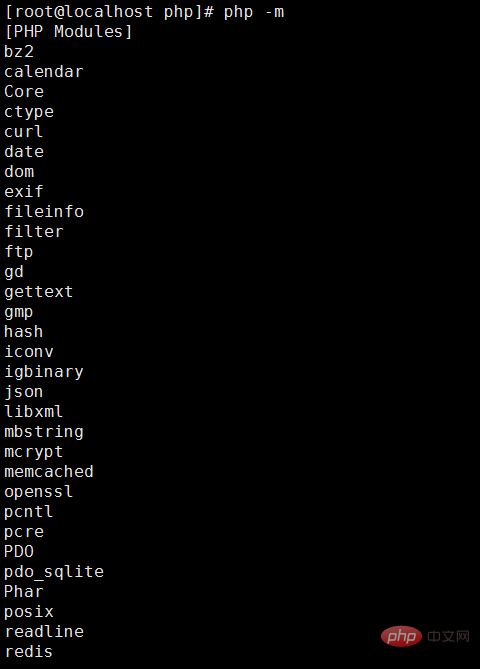How to install the latest version of php7 using yum

php video tutorial"
1. First, update the yum source, otherwise it must be an old version, usually 5.6 and below, but php7 It has been out for a long time, and the performance has improved by more than 50%! Update the yum source according to the system. Mine is centos7, so I run the following code! CentOS/RHEL 7.x:rpm -Uvh https://dl.fedoraproject.org/pub/epel/epel-release-latest-7.noarch.rpm rpm -Uvh https://mirror.webtatic.com/yum/el7/webtatic-release.rpm
CentOS/RHEL 6.x:
rpm -Uvh https://dl.fedoraproject.org/pub/epel/epel-release-latest-6.noarch.rpm rpm -Uvh https://mirror.webtatic.com/yum/el6/latest.rpm
yum install php70w-common php70w-fpm php70w-opcache php70w-gd php70w-mysqlnd php70w-mbstring php70w-pecl-redis php70w-pecl -memcached php70w-develWith just this command, you can install the following extensions! php-api, php-bz2, php-calendar, php-ctype, php-curl, php-date, php-exif, php-fileinfo, php-filter, php-ftp, php-gettext, php-gmp, php-hash, php-iconv, php-json, php-libxml, php-openssl, php-pcre, php-pecl-Fileinfo, php-pecl-phar, php-pecl-zip, php-reflection, php-session, php-shmop, php-simplexml, php-sockets, php-spl, php-tokenizer, php-zend-abi, php-zip, php-zlibAre you excited? Don’t worry, there are even better ones! Generally, memcached, gd, mysql, etc. need to be installed, right?
安装包 提供的拓展 php70w mod_php , php70w-zts php70w-bcmath php70w-cli php-cgi, php-pcntl, php-readline php70w-common php-api, php-bz2, php-calendar, php-ctype, php-curl, php-date, php-exif, php-fileinfo, php-filter, php-ftp, php-gettext, php-gmp, php-hash, php-iconv, php-json, php-libxml, php-openssl, php-pcre, php-pecl-Fileinfo, php-pecl-phar, php-pecl-zip, php-reflection, php-session, php-shmop, php-simplexml , php-sockets, php-spl, php-tokenizer, php-zend-abi, php-zip, php-zlib php70w-dba php70w-devel php70w-embedded php-embedded-devel php70w-enchant php70w-fpm php70w-gd php70w-imap php70w-interbase php_database, php-firebird php70w-intl php70w-ldap php70w-mbstring php70w-mcrypt php70w-mysql php-mysqli, php_database php70w-mysqlnd php-mysqli, php_database php70w-odbc php-pdo_odbc, php_database php70w-opcache php70w-pecl-zendopcache php70w-pdo php70w-pdo_sqlite, php70w-sqlite3 php70w-pdo_dblib php70w-mssql php70w-pear php70w-pecl-apcu php70w-pecl-imagick php70w-pecl-memcached php70w-pecl-mongodb php70w-pecl-redis php70w-pecl-xdebug php70w-pgsql php-pdo_pgsql, php_database php70w-phpdbg php70w-process php-posix, php-sysvmsg, php-sysvsem, php-sysvshm php70w-pspell php70w-recode php70w-snmp php70w-soap php70w-tidy php70w-xml php-dom, php-domxml, php-wddx, php-xsl php70w-xmlrpc
yum install php70w-xml
Check the php version :
php -v

Check out the php extension:
php -m
 ##See it? ? Basically, all the extensions you can use are available, right? If you want anything, just go to yum and it will be fine! No more having to worry about various dependency issues!
##See it? ? Basically, all the extensions you can use are available, right? If you want anything, just go to yum and it will be fine! No more having to worry about various dependency issues!
Install redis and memcached, just install it directly with yum:
yum install -y memcached redis
systemctl 提供了一组子命令来管理单个的 unit,其命令格式为: systemctl [command] [unit] command 主要有: start:立刻启动后面接的 unit。 stop:立刻关闭后面接的 unit。 restart:立刻关闭后启动后面接的 unit,亦即执行 stop 再 start 的意思。 reload:不关闭 unit 的情况下,重新载入配置文件,让设置生效。 enable:设置下次开机时,后面接的 unit 会被启动。 disable:设置下次开机时,后面接的 unit 不会被启动。 status:目前后面接的这个 unit 的状态,会列出有没有正在执行、开机时是否启动等信息。 is-active:目前有没有正在运行中。 is-enable:开机时有没有默认要启用这个 unit。 kill :不要被 kill 这个名字吓着了,它其实是向运行 unit 的进程发送信号。 show:列出 unit 的配置。 mask:注销 unit,注销后你就无法启动这个 unit 了。 unmask:取消对 unit 的注销。
For example, start php-fpm and start it automatically:
systemctl start php-fpm systemctl enable php-fpm systemctl reload php-fpm #更改php.ini里面的内容之后平滑重载
The above is the detailed content of How to install the latest version of php7 using yum. For more information, please follow other related articles on the PHP Chinese website!

Hot AI Tools

Undresser.AI Undress
AI-powered app for creating realistic nude photos

AI Clothes Remover
Online AI tool for removing clothes from photos.

Undress AI Tool
Undress images for free

Clothoff.io
AI clothes remover

Video Face Swap
Swap faces in any video effortlessly with our completely free AI face swap tool!

Hot Article

Hot Tools

Notepad++7.3.1
Easy-to-use and free code editor

SublimeText3 Chinese version
Chinese version, very easy to use

Zend Studio 13.0.1
Powerful PHP integrated development environment

Dreamweaver CS6
Visual web development tools

SublimeText3 Mac version
God-level code editing software (SublimeText3)

Hot Topics
 1386
1386
 52
52


